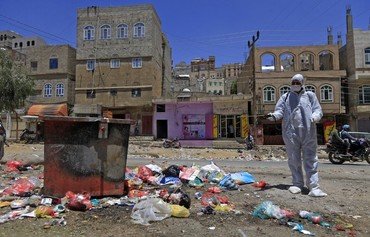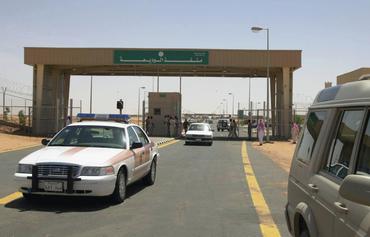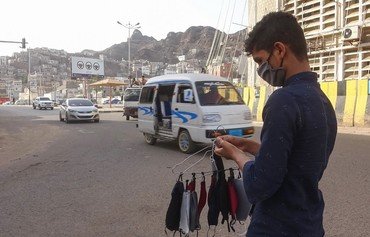UN Special Envoy for Yemen Martin Griffiths has warned that the novel coronavirus (COVID-19) pandemic and a global economic downturn are threatening more adversity in Yemen if lasting peace is not achieved.
During a Thursday (May 14th) UN Security Council briefing on the political and humanitarian situation in Yemen held via videoconference, Griffiths said the warring parties in Yemen have made "significant progress" towards agreeing to a ceasefire.
However, he underscored that peace is part of a broader package of needs that must be agreed to, including humanitarian and economic measures.
The UN has provided "a feasible roadmap" that puts the onus on "those with arms and power" to achieve it, he said.
"The people of Yemen are right to be frustrated about the slow pace of these negotiations," he added. "We hope to see these negotiations soon come to a successful close."
Meanwhile, Yemen's supreme emergency committee for combatting coronavirus reported Thursday that the number of new infections has risen to 85, including 12 deaths.
The committee added that 15 new confirmed cases were recorded, including three for the first time in al-Daleh province, seven in Aden, four in Lahj and one in Hadramaut.
The capacity to test for COVID-19 in Yemen is extremely limited and "it is impossible to know the full extent of the spread of virus", said Doctors without Borders (MSF) Friday.
Need to support health sector
"The current power struggle in Aden has greatly affected the health sector's capability to deal with the spread of COVID-19 and treat patients who are infected with other diseases that have similar symptoms," said Mohammed Rubeid, deputy general manager of the Health and Population Office in Aden.
"About 70 are dying every day from other epidemic fevers that have spread as a result of torrential rain in Aden," he told Al-Mashareq. "In most cases, families of the deceased do not know the cause of death."
Rubeid stressed the need to support the health sector and called on all parties to lay down their arms and to instead focus on confronting the pandemic.
In its briefing before the Security Council on Thursday, Yemen's government urged the World Health Organisation (WHO) to urgently intervene and pressure the Iran-backed Houthis (Ansarallah) to share information and transparently reveal the true numbers of coronavirus infections in areas under their control.
"This is to avoid a looming catastrophe and to protect millions of civilians who have been exhausted by the war," the government said.
It also urged donor countries and aid organisations to provide more assistance and urgent medical support, including conducting early testing on a large scale and supplying health workers with personal protective equipment (PPE) and hospitals with ventilators.
"The duty of warring parties in the north and south [of Yemen] is to put the Yemeni people's interests first and foremost by engaging in peace negotiations," political analyst Adel al-Shujaa told Al-Mashareq.
This is crucial in order to confront COVID-19, especially in light of Yemen's dilapidated healthcare sector and lack of medical services, he said.
"Peace is the best chance Yemen has to contain COVID-19, and we hope the parties will work with the Special Envoy to make it a reality," UN's acting Deputy Emergency Relief Co-ordinator Ramesh Rajasingham said Thursday.

![UN Special Envoy for Yemen Martin Griffiths (centre) arrives for a meeting with Houthi officials in the embattled Yemeni Red Sea port city of al-Hodeidah on January 29th, 2019. [Abdo Hyder/AFP]](/cnmi_am/images/2020/05/15/24087-yemen-griffiths-un-600_384.jpg)







All parties who embrace national and religious principles should forget all political, economic, sectarian and regional differences. All parties in this country should work hard to confront this epidemic. They should meet as soon as possible. The meeting should be based on the following: First: Conducting a study on how to communicate to citizens, via radio, TV, and social media, that this epidemic is dangerous; Second: Conducting a study, via the Finance Ministry, on how to allocate money and distribute it to citizens equally, whether employees or not, except for the Health Ministry employees, and after that, a quarantine should be imposed; Third: Conducting a study on security, whereby security can be provided for all; Fourth: Conducting a study on the health aspect as a whole, and to decide what citizens need if they are infected with this disease, and what doctors need, in terms of health, financial and prevention aspects; and Fifth: Conducting a study on deploying awareness committees. Such committees should be divided as follows: 1. Field and popular committees; 2. Media committees, via radio, TV or social media; 3. Health committees, overseen by the Health Ministry; 4. Military committees, affiliated to all military institutions; 5. Religious committees, via mosques; and 6. Control committees, to monitor all of these committees. Sixth: Conducting a study on the prevention aspect, by spraying all cities and villages. After that, citizens should be bound to
Reply3 Comment(s)
UN aid won't reach the citizens in the required way. Citizens will only receive a little.
Reply3 Comment(s)
Can I find a video of the relatives of coronavirus victims, even if from a distance? Thanks.
Reply3 Comment(s)